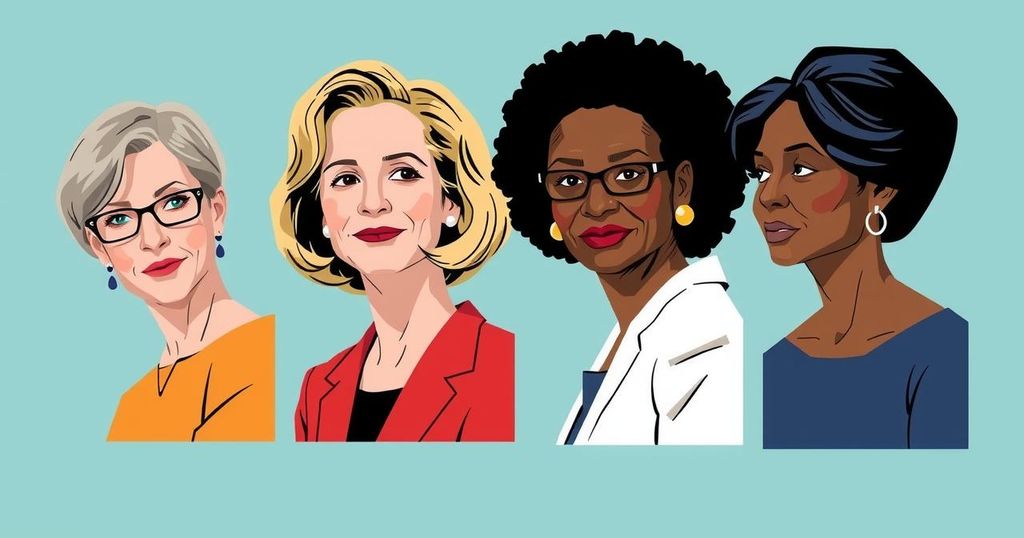Politics
2024 ELECTIONS, AFRICA, ANDRES MANUEL LOPEZ OBRADOR, ASIA, BBC, DUARTE MUTZENBERG, FOREIGN POLICY, GENDER EQUALITY, GOVERNANCE, INDONESIA, INTER - PARLIAMENTARY UNION, IPU, JULIE BALLINGTON, MARIANA DUARTE MUTZENBERG, MONGOLIA, NAMIBIA, PARLIAMENT, UN WOMEN, US, VOTER TURNOUT, VOTING INTENTIONS
Jamal Walker
0 Comments
Stagnation in Women’s Political Representation: Insights from 2024 Elections
The year 2024 saw a lack of growth in female political representation globally, with many countries experiencing declines in women’s parliamentary numbers. Despite some countries making gains through gender quotas, the overall increase in female representation was negligible at 0.03%. The challenges to women’s political participation remain complex, including ambition gaps, financial barriers, and increasing hostility toward women in politics. The situation highlights the necessity of ongoing efforts to promote gender parity in governance.
In 2024, a significant number of countries across the globe conducted elections, yet this year marked a stagnation in the growth of women’s representation in political positions. The elections held in approximately 27 new parliaments resulted in a reduction of female lawmakers, with notable declines occurring in nations such as the United States, Portugal, Pakistan, India, Indonesia, and South Africa. Furthermore, the European Parliament recorded a historic first by electing fewer women than in previous years.
Data compiled from 46 countries by the Inter-Parliamentary Union (IPU) revealed that almost two-thirds experienced a decrease in the number of women elected. While there were notable victories for female representation in the United Kingdom, Mongolia, Jordan, and the Dominican Republic, the overall global growth rate for women in governance was marginal at 0.03%. In stark contrast, progress had previously doubled from 1995 to 2020.
Mariana Duarte Mutzenberg of the IPU highlighted ongoing vulnerabilities in certain democracies, noting that Tuvalu lost its only female parliamentary representative, leaving it devoid of any women in government. Currently, the global representation of women in parliaments is at 27%, with only 13 countries approaching gender parity. Gender quotas have proven effective in some regions, with Mongolia’s introduction of a 30% candidate female requirement leading to a jump in representation from 10% to 25%.
Countries without gender quotas have only elected approximately 21% women, compared to 29% in those that do. The experience of Mexico, which achieved gender parity in 2018 through political commitment, exemplifies the positive impact of such measures. However, cabinet positions reflect the least female representation among political roles, perpetuating traditional gender roles and limiting women to specific ministries.
Challenges to women’s political aspirations persist, such as the ambition gap, where women often require encouragement to pursue leadership roles. Financial constraints, greater caregiving responsibilities, and insufficient maternity leave policies further hinder women’s candidacy. Furthermore, electoral systems largely influence election outcomes, with proportional representation yielding better results for female candidates than first-past-the-post systems.
An alarming trend is the rising hostility directed toward women in politics, manifesting in both online harassment and physical threats, particularly during elections in regions like Mexico. Such violence engenders a chilling effect, deterring young women from seeking political office. Additionally, there is a backlash against female empowerment, as evidenced in South Korea, where some male voters responded negatively to women’s rights advocacy. Despite the increase in gender-based violence in elections, more women may still cast their votes, signaling a complex social dynamic at play.
Achieving gender equality in legislative bodies is not merely a matter of fairness. Research indicates that diversity enhances decision-making and promotes better economic outcomes. Further, women’s involvement in peace negotiations has been linked to more sustainable agreements. Exceptional voices in organizations like UN Women challenge observers to reconsider perspectives on gender representation, emphasizing that the real issue lies in the over-representation of men in power rather than the under-representation of women.
The necessity for greater participation of women in political systems is rooted in equity and the recognized benefits that diverse leadership offers to society. Despite previous decades of progress, the past election cycle unveiled troubling trends that undermine the advancement of women in politics. This stagnation has profound implications for policy development, governance, and overall societal growth, necessitating urgent attention and action from governments and organizations worldwide.
In conclusion, the 2024 elections revealed a disconcerting trend in the representation of women in political offices globally, marking a near standstill in progress with significant declines in many countries. While some nations have successfully implemented gender quotas to improve women’s representation, several systemic barriers remain entrenched. The intersection of political will, societal attitudes, and electoral frameworks plays a critical role in shaping the landscape for women in governance. Fostering a supportive environment for women in politics not only promotes equity but is essential for enhancing decision-making processes and achieving sustainable development.
Original Source: www.bbc.com




Post Comment